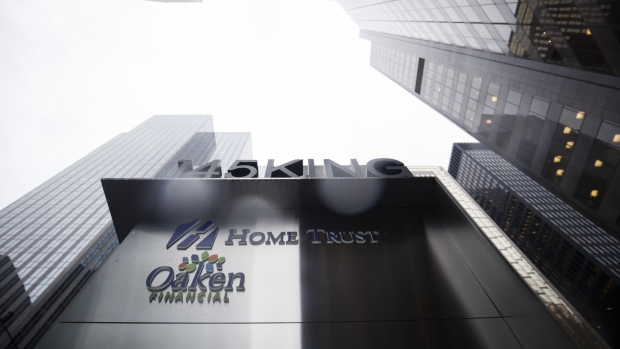It took two years, but Home Capital Group Inc. shares have regained ground lost since the Canadian alternative mortgage lender almost collapsed in 2017.
Home Capital shares have almost doubled this year and are the sixth-best performing stock on Canada’s benchmark S&P/TSX Composite Index. The Toronto-based lender traded at $28.86 at 1:26 p.m. on the Toronto Stock Exchange, and has been hovering at levels last seen in February 2017, before the stock plunged as Ontario’s securities regulator accused the company of misleading shareholders over falsified mortgage applications.
Alternative lenders including Home Capital and Equitable Group Inc. have seen their stocks surge this year as the pace of mortgage growth picked up during the spring home-buying season, and home sales recovered in major cities including Toronto and Vancouver.
The “significant” share price appreciation of the alternative lenders is reflective of improving housing conditions -- particularly in Greater Toronto -- as well as a benign credit environment and robust mortgage growth outlook, CIBC analyst Marco Giurleo said in a Nov. 1 note to clients. He upgraded Home Capital to “outperformer” based on the company’s “path to double-digit profitability”, a strong mortgage growth outlook and attractive valuation.
Home Capital’s stock went into a free-fall in the weeks after the regulator’s allegations, fueled by short-selling and a run on deposits. Shares sunk to as low as $5.85 in May that year, before Warren Buffett stepped in to buy a 38 per cent stake in Home Capital and backstopped the lender with a $2 billion (US$1.5 billion) credit line through Berkshire Hathaway Inc. Berkshire has since cashed in as the stock has recovered.
Home Capital is scheduled to release third-quarter earnings results on Nov. 13, with analysts expecting the company to post adjusted earnings of 58 cents a share.
While Home Capital’s shares have recovered, the lender’s assets and mortgage book haven’t quite reached their pre-crisis levels. The company had $18.5 billion of assets at the end of the second quarter, down from a peak of $21 billion at the beginning of 2017, while single-family residential mortgages were $10.9 billion compared with about $11.3 billion two years earlier.










